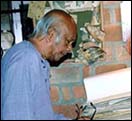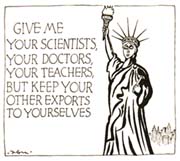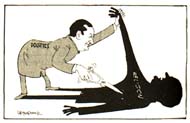The Rediff Interview/ Abu Abraham
'People like Maneka Gandhi are fanatics -- they are worse than Khomeini'
In those days, was it very difficult for an Indian to establish
himself in England?
 Yes. It was sheer hard work that saw me through.
It was a great strain to
produce something every Friday. Sometimes, on Friday morning, when you have finally come up with an idea, you find somebody has already done it!
Yes. It was sheer hard work that saw me through.
It was a great strain to
produce something every Friday. Sometimes, on Friday morning, when you have finally come up with an idea, you find somebody has already done it!
And you had to maintain a certain standard.
The editor didn't mind if my opinions differed from his, but he
wanted a certain quality. That helped me a lot. When I joined The Guardian later, I could draw much
faster. I had to, as it was a daily paper.
Do you consider yourself lucky?
Lucky? Hmm... but I achieved the standard I did through sheer hard work.
Does that mean you can establish yourself anywhere
in the world if
you are talented and hard working?
Yes. You asked me whether I was lucky. I was lucky in the sense
that throughout my career, I didn't have to apply for a job except
the first time. All others were offered to me.
The main thing about cartooning is that it is not the quantity that matters, but the quality of your ideas. You can't think up something and make
news and events. You can have your opinions but it should
be based
on reality.
Can a cartoonist be impartial?
There is nothing like impartiality
in cartoons. I was never impartial. I always expressed a point of view.
There was a lot of objection from people, even my own colleagues.
It was the time of decolonisation in Africa and Asia. And then there
was Cyprus and Algeria. I did some sharp cartoons
on those. So the conservatives began saying
I was not fair.
Because you were an Asian?
Not really. Of course there were some nut-cases who used to
write saying 'go back to where you came from' and that kind of thing.
But soon, they too got used to my work.
We have heard a lot about the British sense of humour.
How
different is it from the Indian version?
There are different variations, actually. There was
the type practiced by Harry Sickom and two others. They used to take off
on Indian pronunciation. Then there is this very dry variety... usually,
a remark which you make with a straight face without laughing.
My humour was very close to the English one. After all, English
had been my main language. I had read a tremendous
lot. From the day I arrived in England, I didn't waste time. I listened to all radio programmes including Women's
Hour and Children's Hour just to educate myself. When you are
in a foreign country, there is a lot of work that you have to
do. By the time I got the job at The Observer,
I knew the country, its socio-political
history and the idioms well. That is very important.
In most of your works, it is the politicians who are at the receiving end. Were there any protests from them?
No. They knew they would be making fools of themselves if they protested. But when the cartoons
indirectly flattered them, they used to ask for the original drawing.
When it was sharply critical, they would just keep quiet.
There is a framed cartoon of yours in former President
R Venkataraman's office room.
Is there? In Delhi?
No, in Madras.
About the Budget?
Yes, Venkataraman with the finance minister's briefcase
in his hand, lots of lipstick marks on his face, and a housewife
kissing him on the cheek.
Yes, yes. Because of that he once introduced me to somebody saying, 'He nearly
caused my divorce!'
Which politicians did you find the easiest to caricature?
There was Raj Narain... But, in reality, no good caricature is easy.
For instance, to do a good caricature of Indira Gandhi was extremely difficult because she had a very, very sensitive face. Of course, you could draw a long nose and some grey hair and call it Indira Gandhi. I have never done that.
Recently, a British cartoonist on BBC said
he would highlight Tony Blair's smile, teeth and big ears.
Do you also concentrate on prominent
features of a personality?

A good cartoon is not different from a portrait,
except the emphasis is
more on certain features. In
both cases, the idea is to get the character
of a face. To draw somebody always in the same way, like showing
Tony Blair's teeth, becomes a boring cliche. That's the easy way. But it will become boring.
That is, there is something more to a person's personality than his
features?
Yes. The exaggeration should be for the purpose
of bringing out the character. There are not many
good caricaturists today. No one of the stature of David Low or Shankar. Shankar
was a good caricaturist. He used to study the face before drawing it.
You left Kerala when you were 20. Why did you decide to
come back after so many years?
Nostalgia, what else? I wanted to spend the rest of
my life here. It proved to be wise
decision. Had I continued in Delhi, I might have been dead by
now. The city is so polluted, the intellectual life
even more so.
And Trivandrum?
Here I get a lot of affection and love. The sea and all
these things, I missed in Delhi.
And sea food too, I bet! Especially sardines, right?
Yes, that's right. Then of course, I wanted to change the pace,
I wanted to slow down a bit. So I decided to work from home.
But you are away from the place of all political action.
In some ways, it is an advantage because you can analyse it
more objectively from a distance. But I go to Delhi once or twice
a year.
Do you feel satisfied with the intellectual interactions here
in Trivandrum?
I don't get much interaction. But I can find people
if I want to consult... Like Madhavan Kutty of The Indian Express.
I discuss local and national politics with him. In Delhi, it is only an illusion that you can have intellectual interaction.
That is one place where gossip is very unreliable.
The Kerala you left behind years ago must have been a very
different one from today's Kerala. Over the years, people say, it has changed for the worse. What do think?
 How can anybody say it has changed for the worse? Half the students in
my primary school came without anything above their waist. Some of them
used to walk 3 to 5 miles
to get to school. They didn't have umbrellas.
They would come holding banana leaves over their heads, come totally
drenched. That sort of things do not
happen now.
How can anybody say it has changed for the worse? Half the students in
my primary school came without anything above their waist. Some of them
used to walk 3 to 5 miles
to get to school. They didn't have umbrellas.
They would come holding banana leaves over their heads, come totally
drenched. That sort of things do not
happen now.
Then why is it that cultural personalities and environmentalists
always cry hoarse that Kerala is going from bad to worse,
especially its environment?
Rubbish. Kerala is four times as green now than in my school
days. Everybody is growing trees
here. What do these environmentalists want? They stop dams,
they do not want any power or atomic energy plants... Nothing!
They talk only about trees. No trees should
be cut, so no new roads, no canals, no nothing!
Sugatha Kumari
tells me there should be no more dams. But what I say is there
should be a thousand more of dams and canals in the
next 10 years. That is the way to a green state. These people
live in a kind of seclusion. When you go to Delhi by train, you
realise how much arid land there is which can be converted.
If water is brought there, you can grow trees and it can be cultivated.
It has become a very negative movement, this environmentalism.
Their favourite sentence is, we don't want consumerism. Some law students came here and they wanted me to sign some statement
against atomic energy. I said I am for atomic energy. But I am
against atomic bombs. Shouldn't mix up the two, I told them. Then
they said, we are against consumerism. I asked what consumerism?
When 80 per cent of the people in this country don't have a decent
standard of living, they are talking about consumerism!
Here there is no energy, no power, no factories, nothing... People
are anti-science, anti-technology. Even this Sastra Sahitya Prishad
which is doing very good work educating people, has joined this
bandwagon.
In such a situation, then, what do you see for the state in the next few years?
I don't know. These people have no sympathy for science
or technology. I don't think any of them studied science.
They all took economics, history or law.
People like
Maneka Gandhi are fanatics -- they are worse than Khomeini. She
is propagating vegetarianism. She has no business to do that.
Let her put all your cows in the gosalas! Let the cows take
over! This nonsense has been going on for sometime. The government has
to be firm. Now anybody can go to court and stop anything. They
can stop prawn cultivation, they can stop anything now. But I
am sure soon there will be a reaction to that.
I think you love nature and animals a lot. You have ducks,
dogs, fish and parrots here...
 I have got two goats too. Maneka Gandhi curses goats. According
to her, one goat can create thousands of acres of desert. That's all myth. Goats survive in deserts on
thorns and other things. So when you see a herd of goats grazing
in an arid area, you think the goats created it. That's like saying camels created the Sahara desert!
I have got two goats too. Maneka Gandhi curses goats. According
to her, one goat can create thousands of acres of desert. That's all myth. Goats survive in deserts on
thorns and other things. So when you see a herd of goats grazing
in an arid area, you think the goats created it. That's like saying camels created the Sahara desert!
All these NGOs, they get a lot of money from abroad. I am really suspicious
about their activities. I get these people coming from London or
France who are onto this racket of environmentalism. I took
a person from London to Vellanad, and on the way I showed him
the Karamana dam and told him we get water from this dam.
He immediately asked do you think it is a good thing? You just
can't argue with them. They do not want us to progress. They want
to create a global village where white man will be landlords
and the browns and blacks their peasants.
Atomic energy is good for all white
countries -- it is good for France, England, America, Israel, but
it is not good for us! This is new colonialism!
Photographs: Sanjay Ghosh
Tell us what you think of this feature
|



